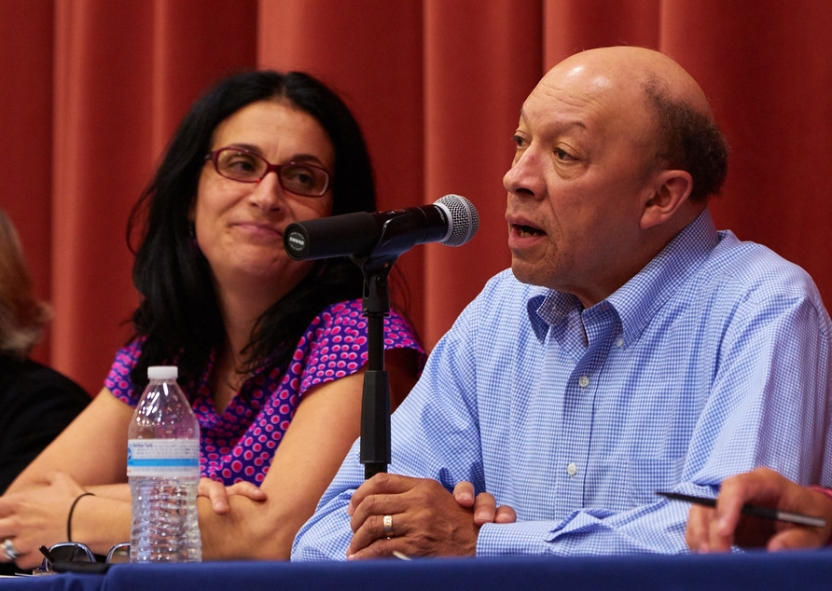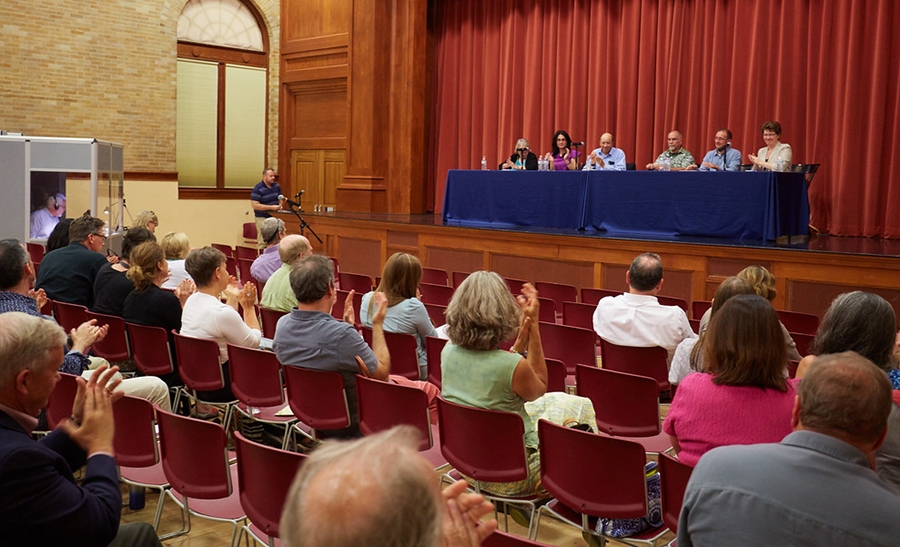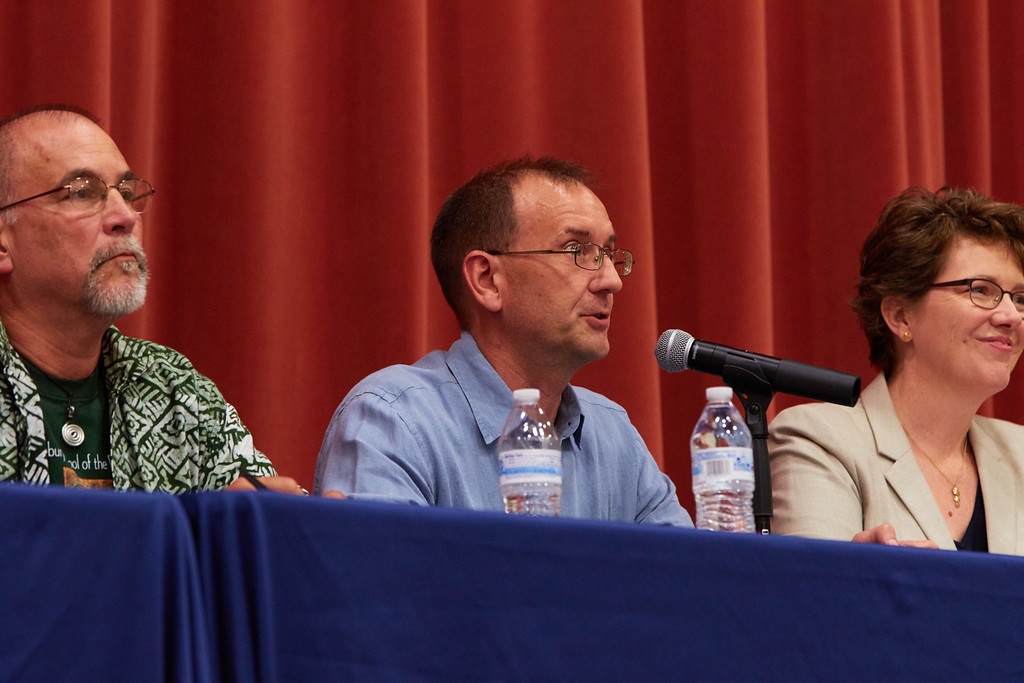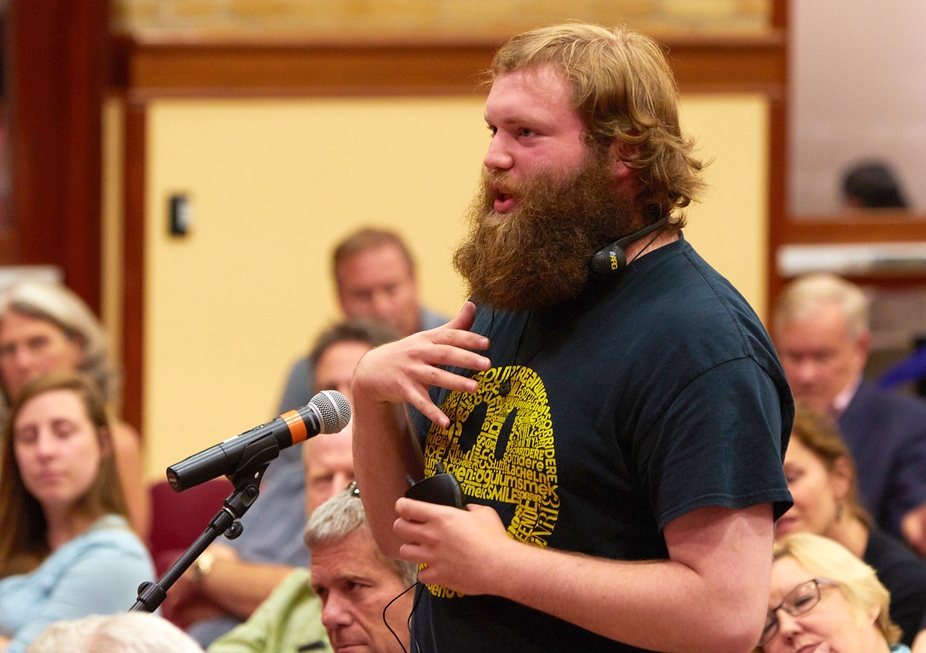Middlebury Professors Discuss Immersive Learning in the Digital Age

MIDDLEBURY, Vt. – Faculty members from across the Middlebury spectrum examined the practice of immersive learning in the digital age at an Envisioning Middlebury panel discussion on July 12 in Wilson Hall.
Panelists from the Language Schools, Bread Loaf School of English, Schools Abroad, Middlebury Institute, and the undergraduate college itself offered their observations in an effort to a) understand the role of immersive learning at Middlebury today and b) help shape it for the years to come.
Moderator Susan Baldridge, provost and professor of psychology, asked the panelists to discuss Middlebury’s strengths in immersive learning, identify some commonalities and differences across programs, and think about how digital technology might affect immersive learning in the future.
“By answering certain questions” – Who are we? What are our deepest values? What will the future look like? Where do we want Middlebury to go? – “we hope to creatively envision Middlebury’s future,” Baldridge explained.
Jason Merrill ’90, director of the Kathryn Wasserman Davis Russian School, said language immersion was highly effective in the 1980s and 1990s when there was only one telephone on the hall and one television on campus broadcasting Russian-language programming. “We were really isolated here at Middlebury back then,” he said. “But now the Internet and the multitude of devices that connect to it have forever changed the playing field of pedagogy in general and for immersion in particular.”
To counteract some ill effects of technology on language immersion, Merrill gave a presentation titled “The Smart Phone: Friend or Foe” at this summer’s Russian School orientation. The device can be “turned into a best friend” in terms of helping students maintain the Language Pledge, Merrill said, once students understand that “language is about conveying meaning to others and not to electronic devices.”

Robert Stepto, who has served as a professor in the Bread Loaf School of English every summer since 1990, defined immersive learning as “creative pedagogy to ensure student learning and the transfer of knowledge into the workforce.”
Teachers come to Bread Loaf “to immerse themselves in intellectual experiences and conversations that extend beyond the classroom, study areas, porches, dining areas, trails, over hill and dale, and beyond.” Bread Loaf faculty “have no illusions about [Google Drive] folders being a substantial substitute for engaging each other intellectually and creatively.” Moreover, “the great coming together of all of us on the mountain” provides the faculty with some of the most imaginative and creative moments of their lives, he said.
Middlebury’s professor of environmental and biosphere studies, Stephen Trombulak, observed that “science moves forward because of digital technology” and, concurrently, “it is science that helps move digital technology forward.”
Digital technology “can be used quite effectively to sustain and foster collaborative communities in science,” he said. “I teach a natural history course where students are engaged with colleagues and peers from all over the continent connecting with databases that are only possible because of digital technology – databases on the real-time migration of birds, for example.”
Trombulak, who is also the director of science for the undergraduate college, said “immersive learning has been essential to STEM (science, technology, engineering, and mathematics) education at Middlebury.” He noted that science educators are always “looking for sustained engagement” via field camps, research stations, and summer research programs.

The director of Middlebury’s School in Spain, Associate Professor Patricia Rodriguez, said students benefit from a philosophy of “guided independence.” Students on Middlebury’s program in Spain are enrolled in Spanish universities and have to adapt to new institutions, acquire new learning styles, and develop new relationships with professors, staff, and peers.
Middlebury students are permitted to live with Spanish families or with students from Spain or other countries, but not with other American students, Rodriguez said. For decades the School in Spain was based at the Instituto Internacional in Madrid where other U.S. study abroad programs are based and English is spoken freely, so Middlebury shifted its program to a more authentic location in the city.
A student recently told the director that she encountered “so many problems” during her time abroad, but realized afterward how beneficial it was because she discovered ways to correct the issues herself. “We want our students to be autonomous and be able to solve problems by themselves by navigating through the Spanish system,” Rodriguez added.
Beryl Levinger, a distinguished professor and program chair at the Middlebury Institute of International Studies at Monterey, said, “Immersive learning is the development of well-defined skills, knowledge, and attitudes in an environment where students have no or few competing academic demands, and where social capital (or relationships) are purposely built. The learning outcomes are achieved through a blend of formal, structured engagements, such as in a classroom, along with informal, unstructured experiential learning, usually in a field setting.”
The development of social capital contributes to learning, Levinger elaborated, by enabling students to ask questions more freely, feel comfortable outside their comfort zones, excel on team-based projects, live in diverse settings, behave as their “fully authentic selves,” and gain knowledge through their close relationships with others.

The panel ran out of time for conversation among themselves, but there was time for three questions from the audience before the moderator, Provost Baldridge, summed up the session by saying:
“Today we heard enormous passion [from the panelists] around the ways in which immersive-learning pedagogy and immersive environments are getting implemented in different contexts for different purposes in terms of learning different disciplines or languages. The commitment to the values of enhancing learning and doing it in a way that takes advantage of the most immersive circumstances seems to be common across what we heard today.”
The panel discussion was webcast to the Middlebury Institute with simultaneous interpretation provided in Spanish by Barry Olsen, a faculty member in conference interpretation from the Middlebury Institute.
– With photography by Todd Balfour and reporting by Robert Keren

